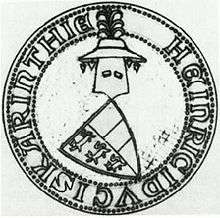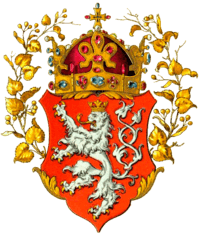Henry of Bohemia
| Henry | |
|---|---|
 Seal of Henry, Duke of Carinthia, 1303 | |
| King of Bohemia | |
| Reign | 3/4 July 1307 – 31 August 1310 |
| Predecessor | Rudolf I |
| Successor | John the Blind |
| Duke of Carinthia | |
| Reign | 1 November 1295 – 2 April 1335 |
| Predecessor | Meinhard |
| Successor | Albert I |
| Count of Tyrol | |
| Reign | 1 November 1295 – 2 April 1335 |
| Predecessor | Meinhard |
| Successor | Margaret with John Henry of Luxembourg |
| Born | c. 1265 |
| Died |
2 April 1335 (aged 70) Tirol Castle |
| Burial | Stams Abbey |
| Spouse |
Anna Přemyslovna Adelaide of Brunswick-Lüneburg Beatrice of Savoy |
| House | Meinhardiner |
| Father | Meinhard, Duke of Carinthia |
| Mother | Elisabeth of Wittelsbach |
Henry of Carinthia (German: Heinrich von Kärnten, Czech: Jindřich Korutanský, c. 1265 – 2 April 1335), a member of the House of Gorizia (Meinhardiner), became King of Bohemia, Margrave of Moravia and titular King of Poland in 1306 and again from 1307 until 1310. He also was Duke of Carinthia and Margrave of Carniola (as Henry VI) as well as Count of Tyrol from 1295 until his death.
Life
Henry was a younger son of Meinhard II of Görz-Tyrol and Elisabeth of Wittelsbach, daughter of Duke Otto II of Bavaria and widow of King Conrad IV of Germany. Upon the partition of the Meinhardiner estates in 1271, his father maintained the Tyrolean lands. In 1276 Meinhard married his daughter, Henry's sister Elizabeth to Albert of Habsburg, son of King Rudolph I of Germany and was enfeoffed with the princeless Duchy of Carinthia in 1286.
After his father's death in 1295, Henry ruled in the Tyrolean and Carinthian estates, at first jointly with his brothers Otto (d. 1310) and Louis (d. 1305), until he outlived them. He secured his position by supporting his brother-in-law Albert I of Habsburg, who thereby was able to defeat rivalling Adolf of Nassau at the 1298 Battle of Göllheim and was elected King of the Romans in the same year. He also helped King Albert to lay siege against Count Palatine Rudolf of Wittelsbach at Heidelberg in 1301.
King of Bohemia
However tensions with the House of Habsburg arose when in 1306 Henry married Anna Přemyslovna, the elder sister of King Wenceslaus III of Bohemia. In the same year, the last Přemyslid ruler prepared for a military camapaign against Poland and appointed his brother-in-law Bohemian regent. Upon Wenceslaus' assassination on August 4, Henry was elected his successor by the Bohemian nobility—against the will his former ally King Albert I of Germany, who intended to install his eldest son Rudolf of Habsburg on the Bohemian throne. King Albert's troops immediately campaigned Bohemia, besieged Prague and deposed Henry, who had to yield to their superior forces.
Rudolf of Habsburg (král kaše) was never accepted by the Bohemian nobles, and after his death on 4 July 1307, Henry was elected King of Bohemia again, on 15 August. Another attack by King Albert was rejected and the threat by the Habsburg dynasty finally fell apart with his assassination in 1308. However, Henry's rule was not stabilized, he turned out to be a weak and wasteful ruler, while the new German king Henry VII from the House of Luxembourg also had cast a covetous eye on the Bohemian kingdom. In 1310 he arranged the marriage of his eldest son John with Elisabeth Přemyslovna, the younger sister of the deceased King Wenceslaus III. Backed by local nobles and his father, John campaigned Bohemia in October. He captured Prague on 3 December and deposed Henry for the second time. John was crowned king the next year, while Henry was forced to retire to Carinthia, where Anna Přemyslovna died without children in 1313.
Retirement
Henry at least managed to retain Carinthia and Tyrol by reconciliation with the Habsburg dynasty, ceding the Savinja Valley to their Styrian duchy. Ne nevertheless was not able to acquire the Carinthian estates that were held by the Prince-Bishops of Bamberg with the consent of Emperor Henry VII.
Despite his deposition, he insisted on the title of a "King of Bohemia" and the involved electoral dignity: he took part in the 1314 double election of the rex Romanorum at Frankfurt, voting for the Habsburg candidate Frederick the Fair. His contested right to vote was one of the reasons for the ambiguous result, as Henry's rival John of Luxembourg gave the Bohemian vote to Louis IV of Wittelsbach. After the 1322 Battle of Mühldorf, Henry helped to arrange an amicable settlement between the competitors.
Marriage and issue
Henry was married three times:
In 1306, he married Anna Přemyslovna (1290–1313). This marriage produced no children.
In 1313, he wed Adelaide of Brunswick (1285 – 16 Aug 1324), daughter of the Welf duke Henry I of Brunswick-Grubenhagen. This marriage produced two daughters:
- Adelaide (1317–25 May 1325).
- Margaret "Maultasch" (1318 – 3 October 1369, Vienna), Countess of Tyrol from 1335 to 1363.
In 1327, he married Beatrice (1310–1331), daughter of Count Amadeus V of Savoy. This marriage produced no children.
Henry also reconciled with the House of Luxembourg and in 1330 married his daughter Margaret off to King John's son John Henry. Since he was the last male heir of the Tyrolean Meinhardiner dynasty, he attempted to maintain their possessions, but ultimately failed. Even though Emperor Louis IV, in return for Henry's mediation in the dispute with Frederick the Fair, had assured him in 1330 that his daughter could succeed him, Louis reneged on his promise in a secret treaty with the House of Habsburg in the same year. After Henry's death in 1335, the Austrian duke Albert II of Habsburg and his brother Otto IV the Merry took control of Carinthia and Carniola. Henry's daughter Margaret could only succeed him in Tyrol, but in 1363 had to bequeath her land to Albert's II son Rudolf IV of Habsburg as well.
Ancestry
| Ancestors of Henry of Bohemia | ||||||||||||||||||||||||||||||||||||||||||||||||||||||||||||||||||||||||||||||||||||||||||||||||||||||||||||||||||||||||||||||||||||||||||||||||||||||||||||||||||||||||||||||||||||||||||||||||||||||||||||||||||||||||||||||||||||||||||||||||||||||||||||||||||||||||||||||||||||||||||||||||||||||||||||||||||||||||||||||||||||||||||||||||||||||||||||||||||||||||||||||||||||||||||||||||||||||||||||||||||||||||||||||||||||||||||||||||||||||||||||||||||||||||||||||||||||||||||||||||||||||||||||||||||||||||||||||||||
|---|---|---|---|---|---|---|---|---|---|---|---|---|---|---|---|---|---|---|---|---|---|---|---|---|---|---|---|---|---|---|---|---|---|---|---|---|---|---|---|---|---|---|---|---|---|---|---|---|---|---|---|---|---|---|---|---|---|---|---|---|---|---|---|---|---|---|---|---|---|---|---|---|---|---|---|---|---|---|---|---|---|---|---|---|---|---|---|---|---|---|---|---|---|---|---|---|---|---|---|---|---|---|---|---|---|---|---|---|---|---|---|---|---|---|---|---|---|---|---|---|---|---|---|---|---|---|---|---|---|---|---|---|---|---|---|---|---|---|---|---|---|---|---|---|---|---|---|---|---|---|---|---|---|---|---|---|---|---|---|---|---|---|---|---|---|---|---|---|---|---|---|---|---|---|---|---|---|---|---|---|---|---|---|---|---|---|---|---|---|---|---|---|---|---|---|---|---|---|---|---|---|---|---|---|---|---|---|---|---|---|---|---|---|---|---|---|---|---|---|---|---|---|---|---|---|---|---|---|---|---|---|---|---|---|---|---|---|---|---|---|---|---|---|---|---|---|---|---|---|---|---|---|---|---|---|---|---|---|---|---|---|---|---|---|---|---|---|---|---|---|---|---|---|---|---|---|---|---|---|---|---|---|---|---|---|---|---|---|---|---|---|---|---|---|---|---|---|---|---|---|---|---|---|---|---|---|---|---|---|---|---|---|---|---|---|---|---|---|---|---|---|---|---|---|---|---|---|---|---|---|---|---|---|---|---|---|---|---|---|---|---|---|---|---|---|---|---|---|---|---|---|---|---|---|---|---|---|---|---|---|---|---|---|---|---|---|---|---|---|---|---|---|---|---|---|---|---|---|---|---|---|---|---|---|---|---|---|---|---|---|---|---|---|---|---|---|---|---|---|---|---|---|---|---|---|---|---|---|---|---|---|---|---|---|---|---|---|---|---|---|---|---|---|---|---|---|---|---|---|---|---|---|---|---|---|---|---|---|---|---|---|---|---|---|---|---|---|---|---|---|---|---|---|---|---|---|---|---|---|---|---|---|---|---|---|---|---|---|---|---|---|---|---|---|---|---|---|---|---|---|---|---|---|---|---|---|---|---|---|---|---|---|---|---|---|---|---|---|---|---|---|---|---|---|---|---|---|---|---|---|---|---|---|---|
| ||||||||||||||||||||||||||||||||||||||||||||||||||||||||||||||||||||||||||||||||||||||||||||||||||||||||||||||||||||||||||||||||||||||||||||||||||||||||||||||||||||||||||||||||||||||||||||||||||||||||||||||||||||||||||||||||||||||||||||||||||||||||||||||||||||||||||||||||||||||||||||||||||||||||||||||||||||||||||||||||||||||||||||||||||||||||||||||||||||||||||||||||||||||||||||||||||||||||||||||||||||||||||||||||||||||||||||||||||||||||||||||||||||||||||||||||||||||||||||||||||||||||||||||||||||||||||||||||||
References
- Marek, Miroslav. "Genealogy of the House of Gorizia". Genealogy.EU.
| Henry of Bohemia Born: c. 1265 Died: 2 April 1335 | ||
| Preceded by Meinhard II |
Duke of Carinthia Margrave of Carniola 1295–1335 With: Otto III and Louis |
Succeeded by Albert II and Otto IV |
| Count of Tyrol 1295–1335 With: Otto III and Louis |
Succeeded by Margaret | |
| Preceded by Wenceslaus III |
King of Bohemia 1306 |
Succeeded by Rudolf I |
| Preceded by Rudolf I |
King of Bohemia 1307–1310 |
Succeeded by John |
